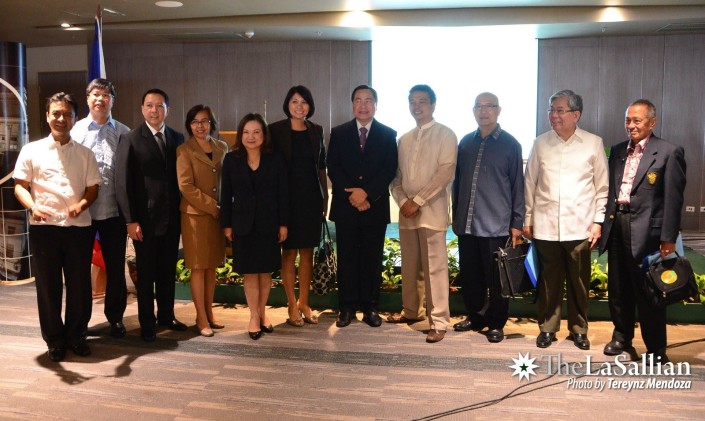The Maritime Law Association of the Philippines (MARLAW), together with their co-presenters Institute for Maritime and Ocean Affairs, Inc. (IMOA) and De La Salle University (DLSU), held an open forum regarding the territorial disputes between the Philippines and China entitled: “Scarborough Shoal: Truths and Lies” last September 26 at the 5th Floor Multipurpose Room of the Henry Sy, Sr. Hall.
Of great interest
The importance of knowing the rightful claim of the Scarborough Shoal was stressed by Maria Rosario Ybanez, Executive Vice President of MARLAW. She said that every Filipino should be aware of this issue because the fight for the territory involves everyone.
Former Deputy Secretary-General of the Association of Southeast Asian Nations (ASEAN) and DLSU Professor Emeritus Wilfrido Villacorta also pushed for the awareness of the national issue.
Republic Act 9522 states that the Scarborough Shoal is part of the Philippine territory, however, since 2012, China has been claiming the area due to their alleged historical rights that Associate Justice of the Supreme Court of the Philippines, Justice Antonio T. Carpio, challenged.
Carpio furthered that ancient Chinese maps state otherwise by illustrating China’s Hainan province to already be the southernmost tip of China. Strengthening his argument, Carpio added that the Philippines, even in their historical maps, had already included and claimed the said territory.
Fact versus fiction
Dr. Jay L. Batongbacal, Director of the University of the Philippines Institute for Maritime Affairs and Law of the Sea, and the keynote speaker of the forum, talked about the different evidence of the self-possession of China on the island, also supplementing it with the Philippines’ right to claim the Scarborough Shoal, which Batongbacal referred to as Bajo de Masinloc. Batongbacal asserted the inconsistencies of China’s ancient cartographic representations with regards to ownership of the island.
He also pointed out how the Chinese misrepresented the shoal, like it being a part of the Spratlys Group of Islands and the oddity of ‘Scarborough Shoal’ as the territory’s name in Chinese maps, considering that the name is English. Meanwhile, he showed evidence to support the Philippines’ rightful claim to the island through the relationship between the Philippines and Bajo de Masinloc, and old maps made by Filipino ancestors.
Batongbacal explained that the interest of the Bajo de Masinloc is not because of the petroleum potential of the area. In fact, petroleum supply is commonly found in places nearer to the coast than the shoal, according to the keynote speaker. The interest of the Philippines on the area, rather, is brought upon by fishing opportunities, mineral possibilities, and navigational freedom.
“For these reasons, Bajo de Masinloc is a focal point of Philippines’ national interest, it has a strategic influence in matters such as environmental security, food security, and defense, an influence that is far greater than its diminutive signs. It is for these reasons that the Philippines sees China’s blockade to Bajo de Masinloc with serious concerns,” he expounded.
Panel’s reaction
Luis T. Cruz, Assistant Secretary for ASEAN Affairs of the Department of Foreign Affairs stressed that the existing arbitration cases do not touch the issue on territorial ownership, but they rather focus on the country’s maritime claims. This is in reference to the point raised in the presentation that the contested area has always belonged to the Philippines.
Cruz also stressed that the territorial dispute has raised other problems such as environmental and security issues. He gave an example stating that Filipino fishermen could no longer fish in the area unlike before, while the Chinese fishermen are harvesting giant clams and corals not only in Bajo de Masinloc, but also in some parts of the Spratly Islands. This malpractice has an effect on the environment since corals play a significant role in mitigating climate change.
Meanwhile, DLSU Political Science Department Professor Richard Heydarian said that China’s claims do not have any historical basis.
“If you look at China’s recent expansionist territorial claims, it’s not really supported by old maps, but it’s supported by a form of cartographic nationalism that started in the early 20th century,” he explained.
He also shared how he was surprised that local and international media began talking about the just issue now. He pointed out that China began increasing its presence in the South China Sea in the 1970s, but has not garnered any attention until recently.
Heydarian also agreed with Batongbacal that the country has committed itself to a legal strategy regarding the dispute, but argued that that course of action is not enough.
“I think one thing we should do is to look beyond the legal strategy, and build up on our own ASEAN strategy,” he concluded.
After the discussions, an open forum was held, followed by the guest speakers’ visit to the Scarborough Shoal exhibit on the 6th Floor of the Learning Commons.


4 replies on “DLSU hosts forum on Scarborough Shoal dispute”
.
ñïàñèáî!
.
ñïñ!
.
ñïàñèáî çà èíôó.
.
tnx for info!!